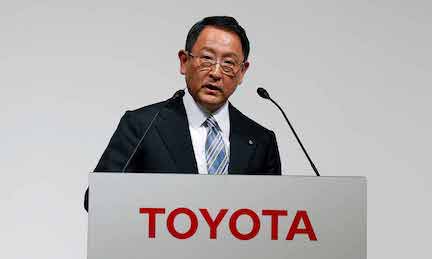Japan’s car companies urged the government to keep up its support for the industry, even as Prime Minister Shinzo Abe and U.S. President Donald Trump signed a trade agreement that removed the threat of auto tariffs on the Asian country.
Akio Toyoda, who serves as the president of the Japan Automobile Manufacturers Association and is the chief executive officer of Toyota Motor Corp., told Trade Minister Isshu Sugawara that he welcomed the pact, but said the industry “faces extremely difficult challenges,” citing a stronger yen, an impending hike in sales tax and other uncertainties.

“The pact maintains and strengthens free and fair trade environment in auto industry between Japan and U.S., and we welcome that,” Toyoda said. “The discussion toward avoiding further tariffs is very beneficial for stakeholders in both countries.”
During negotiations, the association has stressed the fact that Japan’s auto industry has 24 factories, 45 research-and-development or design centers and 39 distribution centers in 28 U.S. states. Japanese carmakers have invested about $51 billion in manufacturing facilities and provide more than 93,000 direct American jobs, the group said.
The trade minister said he welcomed the trade deal. “It’s meaningful that we were able to remove protectionist barriers to the global supply chain,” Sugawara said.
Japan accounted for more than a quarter of the $208.8 billion deficit the U.S. ran with the rest of the world in the trading of passenger vehicles and auto parts last year, according to Commerce Department data.
JAMA also said it will extend Toyoda’s tenure as the president for two years, while Hiroto Saikawa resigned as vice president after stepping down as Nissan Motor Co.‘s CEO earlier this month.











